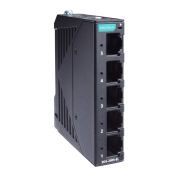
Recommended
5-port entry-level unmanaged Ethernet switches with metal housing
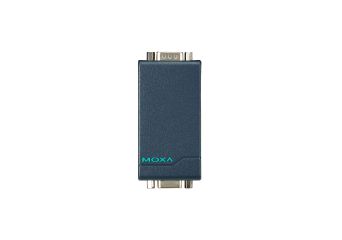
High price? Log in and buy cheaper
Place the order by 12:00, the package will be shipped on the same day
Free shipping from €300
Promocja cenowa na model HDR-15-5
Product intended for professional use only| Model | Availability | Warranty | Wishlist | Your Price | Your Price | Items Quantity Add |
|---|---|---|---|---|---|---|
| TCC-80 RS-232/422/485 Converter. Port Powered. | In stock | Warranty: | €46.00 €56.58 | Login to check your price |
| Model | Availability | Warranty | Wishlist | Your Price | Your Price | Items Quantity Add |
|---|---|---|---|---|---|---|
| TCC-80-DB9 RS-232/422/485 Converter. Port Powered. RS-485 connector: DB9M | In stock | Warranty: | €46.00 €56.58 | Login to check your price |
| Model | Availability | Warranty | Wishlist | Your Price | Your Price | Items Quantity Add |
|---|---|---|---|---|---|---|
| TCC-80I RS-232/422/485 Converter. Port Powered. 2.5 KV Isolation. | In stock | Warranty: | €96.00 €118.08 | Login to check your price |
| Model | Availability | Warranty | Wishlist | Your Price | Your Price | Items Quantity Add |
|---|---|---|---|---|---|---|
| TCC-80I-DB9 RS-232/422/485 Converter. Port Powered. 2.5 KV Isolation. RS-485 connector: DB9M | Out of stock | Warranty: | €96.00 €118.08 | Login to check your price |
The TCC-80/80I media converters provide complete signal conversion between RS-232 and RS-422/485, without requiring an external power source. The converters support both half-duplex 2-wire RS-485 and full-duplex 4-wire RS-422/485, either of which can be converted between RS-232’s TxD and RxD lines.
Automatic data direction control is provided for RS-485. In this case, the RS-485 driver is enabled automatically when the circuitry senses the TxD output from the RS-232 signal. This means that no programming effort is required to control the transmission direction of the RS-485 signal.
The RS-232 port of the TCC-80/80I is a DB9 female socket that can connect directly to the host PC, with power drawn from the TxD line. Regardless of whether the signal is high or low, the TCC-80/80I can obtain enough power from the data line. However, external power can be used if the handshake line is not available, if the serial cable is too long, or if the RS-232 device is a low-power device. For external power, a five to twelve VDC power supply can be connected using an adapter or a USB power cord.
When installing a TCC-80 or TCC-80I converter, it is important to pay attention to power consumption, RS-232 cable length, and RS-422/485 transmission distance. In general, the TCC-80 and TCC-80I obtain 50 mW of power from the power source. Standard PC COM ports can provide 70 to 90 mW of power if the TxD, RTS, and DTR lines are connected. Moreover, the RS-232 cable should be shorter than 15 m (@ 9600 bps) to ensure that less power is lost from the host/device to the TCC-80. The remainder of the supplied power is used for transmitting the RS-422/485 signal.
The RS-232 port of the TCC-80/80I is a DB9 female socket that can connect directly to the host PC, with power drawn from the TxD line. Electrical 2.5 kV isolation for the TCC-80I is achieved with a photo coupler that transforms the electrical signal into light, and then re-transforms the light back into an electrical signal on the other side. In this way, the two electrical circuits are completely isolated from each other. This also protects the devices from ground loop currents, reduces damage caused by data loss, and prevents damage to the communication interfaces.
It’s easy enough to test the serial device with a multimeter to determine that the serial device will provide enough power to the media converter. However, it’s even easier to let the TCC-80I test the device for you. Simply connect the TCC-80I to the device’s RS-232 port and set the SW4 switch to Test mode. If the port power LED indicator lights up, the TCC-80I is receiving enough power. If the LED does not light up, you will need to attach an external power source to the TCC-80I.
| Connector | TCC-80-DB9/80I-DB9: DB9 male TCC-80/80I: Terminal block |
| No. of Ports | 2 |
| Serial Standards | RS-232, RS-422, RS-485 |
| Isolation | TCC-80I/80I-DB9: 2 kV |
| RS-485 Data Direction Control | ADDC® (automatic data direction control) |
| Terminator for RS-485 | N/A, 120 ohms, 120 kilo-ohms |
| Baudrate | 300 bps to 115.2 kbps |
| RS-232 | TxD, RxD, RTS, CTS, DTR, DSR, DCD, GND |
| RS-422 | Tx+, Tx-, Rx+, Rx-, GND |
| RS-485-4w | Tx+, Tx-, Rx+, Rx-, GND |
| RS-485-2w | Data+, Data-, GND |
| Input Current | TCC-80: 30 mA @ 5 to 12 VDC TCC-80-DB9: 30 mA @ 5 to 12 VDC TCC-80I: 20 mA @ 5 to 12 VDC TCC-80I-DB9: 20 mA @ 5 to 12 VDC |
| Input Voltage | 5 to 12 VDC |
| No. of Power Inputs | 1 |
| Overload Current Protection | Supported |
| Power Consumption | TCC-80/80-DB9: 30 mA @ 5 to 12 VDC TCC-80I/80I-DB9: 20 mA @ 5 to 12 VDC |
| Source of Input Power | Power input jack |
| Housing | Plastic top cover, metal bottom plate |
| IP Rating | IP30 |
| Dimensions | TCC-80/80I: 42 x 80 x 22 mm (1.65 x 3.15 x 0.87 in) TCC-80-DB9/80I-DB9: 42 x 91 x 23.6 mm (1.65 x 3.58 x 0.93 in) |
| Weight | 50 g (0.11 lb) |
| Installation | Desktop |
| Operating Temperature | 0 to 60°C (32 to 140°F) |
| Storage Temperature (package included) | -20 to 75°C (-4 to 167°F) |
| Ambient Relative Humidity | 5 to 95% (non-condensing) |
| EMC | EN 55032/35 |
| EMI | CISPR 32, FCC Part 15B Class A |
| EMS | IEC 61000-4-2 ESD: Contact: 4 kV; Air: 8 kV IEC 61000-4-3 RS: 80 MHz to 1 GHz: 3 V/m IEC 61000-4-4 EFT: Power: 1 kV; Signal: 0.5 kV IEC 61000-4-5 Surge: Power: 1 kV IEC 61000-4-6 CS: 150 kHz to 80 MHz: 3 V/m; Signal: 3 V/m IEC 61000-4-8 PFMF |
| Environmental Testing | IEC 60068-2-1 IEC 60068-2-2 IEC 60068-2-3 |
| Safety | EN 60950-1, IEC 60950-1 |
| Vibration | IEC 60068-2-6 |
| Time | 2,781,161 hrs |
| Standards | Telcordia (Bellcore), GB |

Recommended
5-port entry-level unmanaged Ethernet switches with metal housing
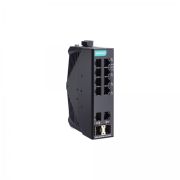
Recommended
8+2G-port Gigabit unmanaged Ethernet switches
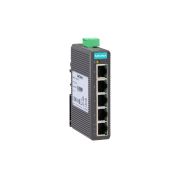
Recommended
5-port entry-level unmanaged Ethernet switches
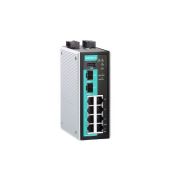
Recommended
8 FE copper + 2 GbE SFP multiport industrial secure router
Have questions? Need advice? Call or write to us!